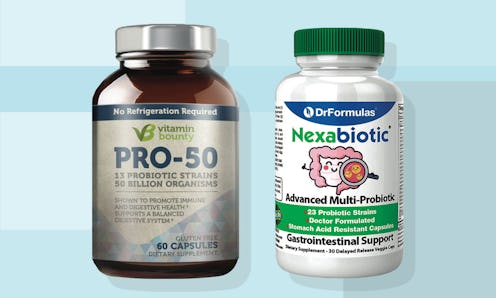Life
The 3 Best Probiotics For IBS
We only recommend products we love and that we think you will, too. We may receive a portion of sales from products purchased from this article, which was written by our Commerce team.
Before adding anything new to your supplement routine you should check with your healthcare professional. But if your doctor decides that probiotics are right for you, the best probiotics for IBS could help alleviate uncomfortable symptoms that you may be struggling with.
According to the Mayo Clinic, irritable bowel syndrome is a chronic condition often managed through diet and lifestyle. While probiotics continue to be studied in relation to IBS, initial results are promising and specific strains could boost your body's microbiome (or collection of microorganisms) to improve gut health.
To find out more, Bustle reached out to expert physicians, Dr. Ian Smith, MD, a bestselling author and television personality, and Dr. Vincent Pedre, MD, a speaker, writer, and author of Happy Gut.
Along with a "probiotic rich-diet," Dr. Smith explains, probiotics can help alleviate several uncomfortable IBS symptoms, like gas, bloating, and constipation as, "Probiotics appear to help rebalance the gut's bacterial environment or microflora which can alleviate some of the symptoms.”
Dr. Smith's recommendation is a probiotic supplement with eight or more strains where Dr. Pedre advises looking for a multi-strain probiotic with upwards of five strains; though he qualifies this isn't a requirement for probiotics to relieve or resolve IBS symptoms.
Following their expert advice, my picks have 13 or more strains to help alleviate digestive issues, including Bifidobacterium infantis 35624, Lactobacillus plantarum, and Bifidobacterium animalis, which have all been shown to help with IBS symptoms, according to Dr. Smith. These three are particularly helpful for alleviating constipation, adds Dr. Pedre. And Lactobacillus plantarum and Bifidobacterium infants are two of the best strains to look for in probiotics for IBS-d (aka IBS with diarrhea).
Probiotics can be a great dietary supplement since they support beneficial gut bacteria growth, but again you should always consult medical advice before introducing any supplement into your diet or IBS management regimen, as their effects on IBS symptoms may vary.
Read on to find the best probiotics for IBS; a few even have prebiotics to help nurture the probiotics.
1The Overall Best Probiotic For IBS
The best probiotic for IBS has a lot of strain diversity, with 23 strains and delayed-release capsules to make sure probiotics make it to your gut. With a 4.5-star rating after over 2,500 reviews from shoppers, it's safe to say that many Amazon reviewers stand by this probiotic, and many remarks how easy to swallow these capsules are.
Of the 23 strains, six of them are key strains recommended by both experts. It also has a few Dr. Pedre mentioned help specific symptoms like constipation, diarrhea, bloating and gas, and abdominal pain. This product is non-GMO and you can take up to three shelf-stable capsules per day (without food) for additional support.
Promising review: "This was surprisingly effective for my ibs. It takes a few days to get used to these (they made me more gassy than usual at first), but after about a week, my ibs symptoms finally subsided - and this was after years of dealing with unpleasant symptoms. So glad I gave these a try!."
2The Best Probiotic With Prebiotics For IBS
This shelf-stable probiotic not only has strains experts recommend, but also has a pretty high strain diversity, with 15 strains, and a prebiotic fiber made from kiwi. This additional prebiotic fiber nourishes your gut's good bacteria for even more microbiome support. Taking one extended-release capsule per day, with or without food, provides key strains for soothing IBS symptoms and restoring digestive health.
It also has a few Dr. Pedre recommended for constipation relief and treating abdominal pain specifically. Reviewers report this pick has even boosted their immune systems. Plus this product was developed in an FDA-approved facility. It's also non-GMO, vegetarian, as well as gluten and lactose-free.
Promising review: "Completely changed my life! I have been plagued with IBS for fifteen years and nothing worked. Prescription pills didn’t make a difference and over the counter (fast acting pills) made me unbearably constipated. These probiotics pills completely balanced my digestive system within two weeks’ time. I no longer vacillate between starving and full, constipated and diarrhea."
3The Best Vegan Probiotic For IBS (With Probiotics)
The Vitamin Bounty Pro 50 may have fewer probiotic strains but it is a great vegan option. It has a 4.7-star rating after over 6,000 reviews. Of the 13 probiotic strains, this pick has five expert-recommend strains to help alleviate symptoms like diarrhea, abdominal pain, and constipation.
This probiotic also features fermented greens for prebiotics, which help to fertilize the good bacteria in your probiotic and already in your gut. Altogether, two shelf-stable capsules, taken daily, help with bloating, gas, and constipation. The manufacturer also claims this product can support immune health. Like my first pick, these capsules are designed for delayed-release to protect the live organisms inside the capsule until they can reach your gut. Plus, this product was developed and tested in an NSF-certified facility. It's also non-GMO and free of gluten, dairy, and wheat.
Promising review: “I wanted to give this time to see if it worked before a review. This product has helped with my IBS issues that no other product has been able to do. I have no stomach discomfort now. I would recommend this product to anyone that has IBS or digestive issues. Product came just as stated. Worth the money! Highly recommend!!”
Experts referenced:
Dr. Ian Smith, physician, best selling author, and TV personality
Dr. Vincent Pedre, a physician, speaker, writer, and author
Studies referenced:
Aragon, G., Graham, D. B., Borum, M., & Doman, D. B. (2010, January). Probiotic therapy for irritable bowel syndrome. Retrieved from https://www.ncbi.nlm.nih.gov/pmc/articles/PMC2886445/.
This article was originally published on
